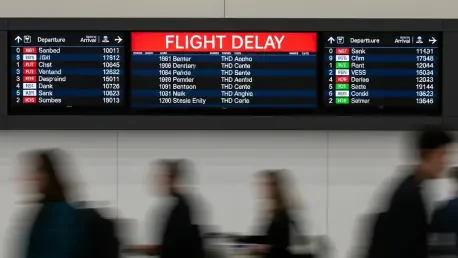Setting the Stage for Change in Nigeria’s Aviation Sector
Imagine boarding a flight in Lagos, only to be stranded at the airport for hours with no explanation, no assistance, and mounting frustration as the minutes tick by with no end in sight. This scenario is all too familiar for countless passengers navigating Nigeria’s aviation landscape, where delays and cancellations have become a persistent blight. As a critical artery of the nation’s economy, the aviation sector facilitates business, tourism, and personal connections, yet its inefficiencies threaten to undermine these vital functions. The Nigerian Civil Aviation Authority (NCAA) has stepped into the fray with a bold new policy of strict sanctions and public accountability, aiming to reshape airline behavior and restore trust in air travel. This report delves into the intricacies of this initiative, exploring whether such measures can truly curb the crisis of flight disruptions.
The aviation industry in Nigeria stands as a cornerstone of economic progress, contributing significantly to GDP through job creation and connectivity across the country’s diverse regions. However, the sector grapples with systemic challenges that tarnish its reputation, with flight delays and cancellations emerging as the most visible pain points for passengers. Major airlines often bear the brunt of public criticism, as travelers face not only inconvenience but also financial losses and emotional stress. This report examines the NCAA’s role as the regulatory watchdog tasked with enforcing standards and protecting passenger rights in an industry struggling to keep pace with demand.
State of Nigeria’s Aviation Industry and Flight Delay Crisis
Nigeria’s aviation sector serves as a lifeline for millions, linking urban centers and remote areas while supporting commerce and tourism. Despite its importance, the industry is plagued by inefficiencies, with airports often operating below capacity due to outdated infrastructure and logistical bottlenecks. The economic ripple effects are profound, as delays disrupt business schedules and deter potential investors wary of unreliable travel. Passenger trust continues to erode as stories of missed connections and ruined plans dominate public discourse, painting a grim picture of an industry in need of urgent reform.
Flight delays and cancellations have reached alarming levels, with data indicating that a significant percentage of domestic flights fail to depart on time. Major carriers frequently cite operational hiccups, yet the impact on travelers is undeniable, ranging from missed professional engagements to personal hardships. The frustration is palpable at terminals across the country, where passengers often find themselves stranded without clear communication or compensation. This pervasive issue has thrust the NCAA into the spotlight, as stakeholders demand accountability from both regulators and airlines.
As the primary oversight body, the NCAA holds the mandate to enforce compliance with aviation regulations and ensure that airlines prioritize passenger welfare. Recent years have seen growing scrutiny of the agency’s effectiveness, with critics arguing that past leniency has emboldened airlines to flout rules. The current crisis underscores the need for a robust regulatory response, setting the stage for the NCAA’s latest policy shift toward stricter enforcement and public accountability as a means to address these longstanding grievances.
NCAA’s New Policy on Airline Accountability
Public Naming and Shaming as Enforcement
In a decisive move to combat non-compliance, the NCAA has introduced a strategy of publicly naming and shaming airlines that fail to adhere to regulations. This approach seeks to leverage reputational risk as a deterrent, compelling operators to improve their service delivery under the glare of public scrutiny. By highlighting specific instances of delays or cancellations, the agency aims to create a culture of transparency where airlines are held accountable for their shortcomings, a tactic that could resonate deeply in a society sensitive to corporate image.
The naming and shaming policy is designed not merely to punish but to foster a proactive mindset among airline management. The NCAA believes that exposing subpar performance will push carriers to invest in better operational systems and staff training to avoid the stigma of being labeled unreliable. While this method is innovative for Nigeria’s aviation context, its success hinges on consistent implementation and public engagement to maintain pressure on defaulting entities.
Passenger Rights and Airline Responsibilities
Central to the NCAA’s new directive is a reaffirmed commitment to passenger rights, including explicit entitlements during disruptions. For instance, passengers stranded between 10:00 PM and 4:00 AM due to cancellations or delays are entitled to hotel accommodations at the airline’s expense, a measure aimed at alleviating the burden of late-night inconveniences. This provision underscores the agency’s focus on ensuring that travelers are not left to fend for themselves during unexpected setbacks.
Equally significant is the NCAA’s strong disapproval of airline staff abandoning passengers during disruptions, a practice that often leaves agency officials to manage agitated crowds. Such behavior not only undermines passenger trust but also places Consumer Protection Officers at risk of hostility in volatile situations. The regulator has made it clear that airlines must maintain a presence and provide support during crises, reinforcing the principle that customer care is non-negotiable regardless of operational challenges.
Challenges Facing Airlines in Nigeria
Nigeria’s unique operating environment poses formidable obstacles for airlines, from inadequate airport infrastructure to inconsistent power supply and fuel availability. Many facilities lack modern equipment, leading to inefficiencies in baggage handling and aircraft turnaround times, which inevitably contribute to delays. Economic pressures, including fluctuating currency values and high operational costs, further strain carriers’ ability to maintain schedules and invest in improvements.
While these hurdles are acknowledged by the NCAA, the agency maintains that they do not absolve airlines of their duty to comply with regulations. Delays caused by external factors still require transparent communication and compensation for affected passengers, a standard that many operators struggle to meet. The regulator’s firm stance signals that excuses rooted in systemic issues will no longer suffice, pushing airlines to seek innovative solutions to persistent problems.
To navigate this complex landscape, airlines could explore partnerships with technology providers to enhance scheduling accuracy and passenger notification systems. Additionally, investing in staff training to handle disruptions with empathy and efficiency might mitigate public backlash. Balancing operational constraints with regulatory demands will require strategic planning, but such efforts could ultimately distinguish compliant carriers in a competitive market.
Regulatory Framework and Enforcement Mechanisms
Nigeria’s aviation regulations form a comprehensive framework designed to ensure safety, efficiency, and fairness in the industry. The NCAA, as the enforcer of these rules, oversees everything from aircraft maintenance standards to passenger treatment protocols, wielding the authority to impose penalties for violations. Recent directives from the Federal Government and the Minister of Aviation have intensified the call for accountability, empowering the agency to adopt a tougher stance against non-compliant airlines.
The introduction of strict sanctions represents a pivotal shift in enforcement tactics, with the NCAA pledging to apply the full weight of the law to address infractions. This includes financial penalties and operational restrictions for repeat offenders, measures intended to deter negligence and prioritize passenger welfare. Protecting agency officials during disruptions has also emerged as a priority, with policies aimed at ensuring that airline staff remain accountable on the ground to prevent chaotic escalations.
The implications of this rigorous enforcement extend beyond immediate penalties, potentially reshaping how airlines approach compliance and customer service. A culture of adherence could emerge if sanctions are applied consistently, though the NCAA must remain vigilant against loopholes exploited by resistant operators. Striking a balance between punitive actions and supportive guidance will be key to fostering sustainable change in the sector.
Future Implications of NCAA’s Strict Sanctions
Looking ahead, the NCAA’s stringent policies hold the potential to transform airline behavior by instilling a sense of urgency around service quality and punctuality. Over the next few years, from this year to 2027, consistent enforcement could lead to measurable improvements in on-time performance and passenger satisfaction, as carriers adapt to avoid sanctions. This shift might also encourage greater investment in operational resilience, aligning Nigeria’s aviation practices more closely with international benchmarks.
However, pushback from airlines is a distinct possibility, as stricter measures may strain already tight budgets and provoke resistance to perceived overregulation. The NCAA will need to anticipate such challenges by engaging in dialogue with industry stakeholders to address legitimate concerns while maintaining its resolve. Building a collaborative framework where airlines view compliance as a competitive advantage rather than a burden could mitigate tensions and foster long-term cooperation.
On a broader scale, these sanctions contribute to the overarching goal of elevating Nigeria’s aviation industry to global standards of accountability and reliability. Enhanced passenger experiences could bolster the sector’s reputation, attracting more international travelers and investors. The journey toward this vision will require sustained commitment from all parties, with the NCAA playing a pivotal role in steering the industry toward a future defined by trust and excellence.
Reflecting on Accountability and Industry Progress
Looking back, the NCAA’s resolute push to end flight delays through strict sanctions and public accountability marked a defining moment in Nigeria’s aviation narrative. The agency’s unwavering stance, coupled with detailed policies on passenger rights, set a precedent for how regulatory bodies could balance empathy with enforcement. The challenges faced by airlines were acknowledged, yet the emphasis remained on compliance as a non-negotiable pillar of service delivery.
As a next step, stakeholders should prioritize the development of a robust feedback mechanism to monitor the impact of these sanctions on both airlines and passengers. Collaborative initiatives, such as joint task forces between the NCAA and industry leaders, could address infrastructure gaps while ensuring that enforcement does not stifle innovation. Investing in technology to predict and manage disruptions might also offer a proactive solution to minimize delays.
Ultimately, the path forward lies in sustained dialogue and adaptability, ensuring that regulatory measures evolve in tandem with industry realities. Empowering passengers with clear channels to voice grievances and seek redress will further cement trust in the system. By focusing on these actionable steps, Nigeria’s aviation sector can aspire to not only meet but exceed global expectations, paving the way for a more reliable and passenger-centric future.









